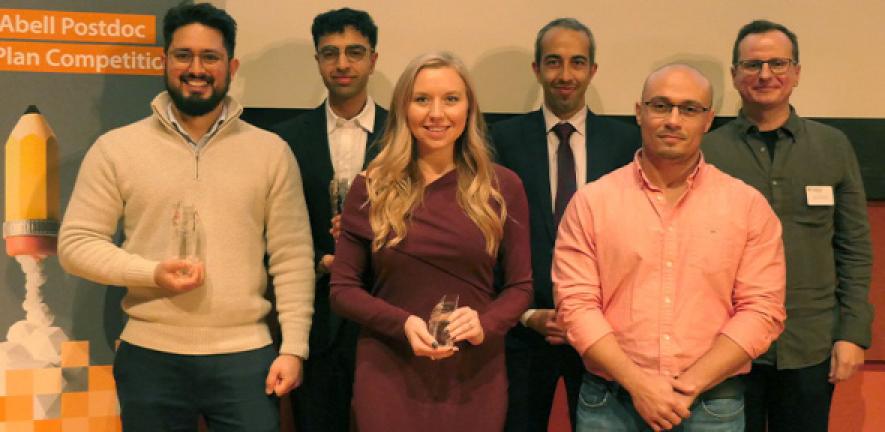
Mark Carrington, a final year PhD student who is jointly supervised by Professor Dame Clare Grey and Professor Oren Scherman, was awarded second prize for Oxonium Energy, which plans to scale-up air-stable battery technology developed in the Grey and Scherman laboratories.
Dr Kamil Sokolowski, a postdoctoral researcher in the Scherman Group, was a finalist with his company Semantics, which plans to develop the core molecular technology, which has applications as metal-free electrolytes for air-stable batteries and as energy mediators in catalysis.
Oxonium
“There’s currently a huge need for back-up battery storage for energy sources like solar, and, especially in the UK, offshore wind,” explains Mark. “This new technology could power cities and turn renewable energy from an intermittent source of energy to secure and steady availability. Batteries which use these metal-free molecules for their electrolytes would be uniquely air-stable, which makes them safe and also means they could be used in harsh conditions or in remote locations. They are based on completely metal-free compounds, which makes them cheaper and more sustainable.”
Oxonium, which Mark co-founded with Grey, will receive a £10,000 investment from Cambridge Innovation Capital, a leading Series A investor in the Cambridge ecosystem, which has a proprietary agreement with the University of Cambridge and a network of entrepreneurs, research institutes and accelerators.
Mark says: “This investment will allow me to purchase equipment for larger-scale demo of the technology towards ultimate grid-scale deployment and validation over the next year.”
Oxonium Energy was also awarded second prize in the 2022 Trinity Bradfield competition in January, where the judges were impressed with the firm’s potential to impact grid-scale energy storage and even capture carbon. The Trinity Bradfield Prize is a leading early-stage Tech & Science awards collaboration between Trinity College and The Bradfield Centre at Cambridge Science Park.
Semantics
Semantics, which Kamil co-founded with Professor Oren Scherman and Dr Jade McCune, plans to develop a library of molecules developed as part of an ERC grant (CAM-RIG), which have tuneable electron transfer properties, and introduce it to the first target market – battery energy storage.
“Emerging energy conversion and storage technologies are mostly based on metals. Finite sources of metals make these technologies expensive and vulnerable to geopolitics with unstable supply chains,” says Kamil. “Semantics offers a solution: 100% metal-free, air-stable electrolytes and catalysts, which are scalable, safe to transport, store and use.” He adds: “This will fully democratise energy storage and catalysis, increasing accessibility and affordability.”
As a finalist in the competition, Kamil will be invited to join ideaSpace, which connects founders, innovators and entrepreneurs across three Cambridge locations, where young entrepreneurs can work alongside other founders and grow their ventures.
“We are extremely excited to start our venture,” says Kamil. “The competition provided an excellent environment for networking and to engage with experts in business development, finance and technology. As a result, we now have a clear business plan with a description of the first target market for Semantics, and valuable support from mentors and experts.”
Overall winner
First prize went to Ismail Sami, who is a member of the Department of Materials Science & Metallurgy and a research fellow at the Faraday Institution. Ismail will receive £20,000 from Cambridge Enterprise to further develop his company, MoSTLi, a next-generation battery startup. MoSTLi is developing lithium-sulphur batteries, which promise higher energy density than alternatives whilst also being cost-effective, lightweight and capable of utilising existing manufacturing processes.
The competition is named in honour of the late Professor Chris Abell, a member of this department, former Pro Vice-Chancellor and a fervent supporter of postdoctoral entrepreneurship. It celebrates the innovative spirit and entrepreneurial drive of the University’s postdoctoral community.
A winning streak
The department has an excellent track record in the business plan competition, with Benjamin Droguet being awarded first prize in 2022 for Sparxell, a spinout from Professor Silvia Vignolini’s Bio-inspired Photonics research group. Sparxell is continuing on its road to success with the recent announcement that it has won first prize in this year’s Biomimicry Institute Ray of Hope prize, which identifies and fosters the growth of the top nature-inspired start-ups in the world.

